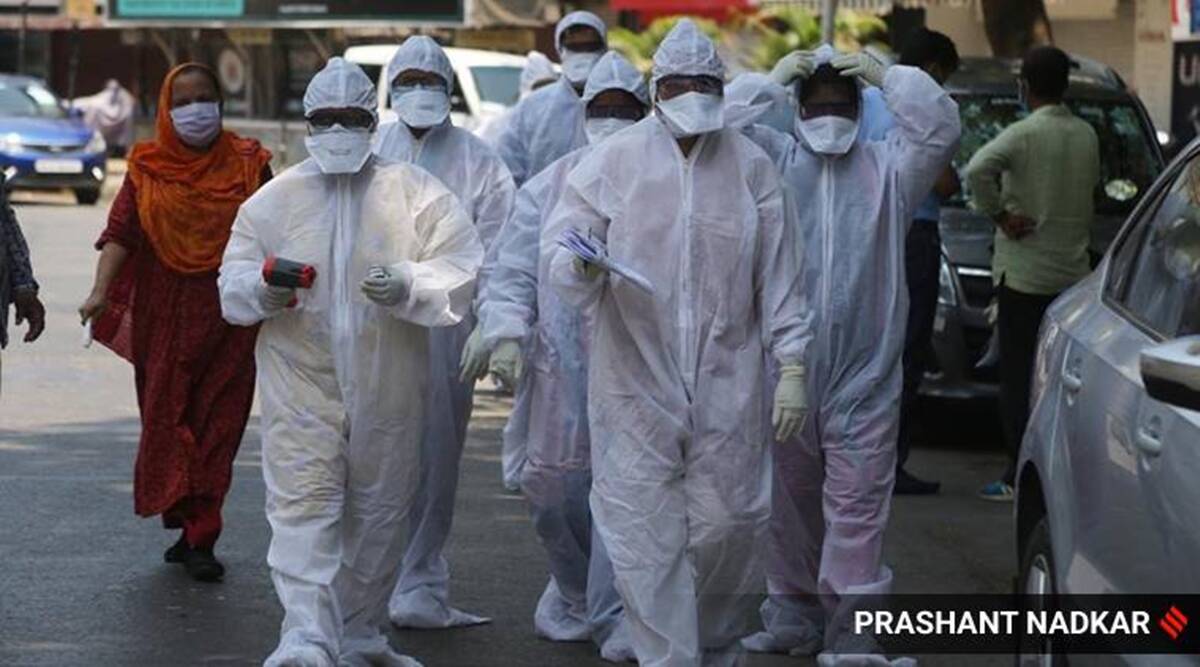 To reduce the load on major hospitals, BMC proposed to upgrade six peripheral hospitals across eastern and western suburbs into postgraduate medical institutes. (Express File)
To reduce the load on major hospitals, BMC proposed to upgrade six peripheral hospitals across eastern and western suburbs into postgraduate medical institutes. (Express File) Reeling under the shadow of Covid-19 pandemic, which has claimed 11,375 lives and infected over 3.1 lakh so far in Mumbai, the Brihanmumbai Municipal Corporation (BMC) earmarked Rs 4728.53 crore to upgrade public healthcare infrastructure in its 2021-22 budget estimate of Rs 39038.83 crore, which was presented before the Standing Committee on Wednesday.
The allocation for health is a 10 per cent increase over last year’s Rs 4,260 crore.
As the city gears up for civic polls next year, the Shiv Sena-led BMC made infrastructure projects a top priority by earmarking Rs 18750.99 crore, with an ambitious 28 per cent increase in capital expenditure.
Budget 2021-22 is an increase of 16.74 per cent over last year’s Rs 33441.02 crore.
“Though BMC is facing various difficulties due to the pandemic, including increased expenditure against the affected revenue collection, the budget estimates are prepared with the vision of upgradation of civic facilities to worldwide standards in order to fulfill our dream of climate and disaster-resilient city and thereby, healthier and happier livelihood,” said Municipal Commissioner Iqbal Singh Chahal in his budget speech.
To reduce the load on major hospitals, BMC proposed to upgrade six peripheral hospitals across eastern and western suburbs into postgraduate medical institutes.
It also plans to provide mobile clinics for primary health treatment. One mobile clinic van each, equipped with trained medical staff, has been proposed for the island city as well as eastern and western suburbs.
For strengthening the existing healthcare infrastructure, BMC has undertaken major structural repairs of 29 hospitals, 287 health posts and 28 maternity homes. For this purpose, it made a budgetary provision of Rs 822.72 crore in 2021-22. Also, renovation work of hospitals, halted by the pandemic, will begin soon. The BMC aims to complete the pending projects by 2022-23.
To enhance the capacity to tackle communicable diseases, BMC proposed upgradation of Kasturba hospital. It further proposed Rs 780.69 crore for the upgradation of existing hospital buildings and new buildings. A super-speciality hospital in Bhandup and a super-speciality wing at Babasaheb Ambedkar Hospital in Kandivali were also proposed.
Despite the low revenue income in 2020-21, BMC scaled up its capital expenditure compared to the last four years. Two of its major sources of income – property tax and development charges – have been hit badly.
In his speech, Chahal announced a target of Rs 7,000 crore revenue from property tax and Rs 2,000 crore from development plan (DP) fees and premiums for 2020-21. But until December 2020, BMC’s revenue income were a measly Rs 738 crore from property tax and Rs 708 crore from DP fees and premiums.
But Chahal expressed confidence that BMC would be able to meet the revenue targets by the year-end and the gap between the revenue income estimate and the collection will only be Rs 400 crore.
He said that BMC’s revenues have declined due to the decisions taken to combat Covid-19 and to provide relief to different sectors affected by the pandemic. “The slowdown in the real estate sector led to a reduction in the assessment of new properties, thereby decreasing revenue collection,” Chahal said.
BMC has not proposed any new taxes or increase. However, as scheduled, the capital value of the property tax will be revised in 2021-22, thus increasing property tax.
There will be no rise in property tax for the financial year 2020-21. Chahal clarified that only the general tax component of property tax will be exempted for properties up to 500 sq ft. Sena, ahead of Assembly elections in 2019, had promised exemption of property tax for houses up to 500 sq ft.
To boost its revenue income, BMC proposed to appoint a fee revision authority, which will suggest a revision of fees for civic amenities, like entry fee to gardens, among others. “The BMC needs funds in the future to meet the increasing capital expenditure. Hence, it is the necessity of time to seek other avenues of income,” said Chahal.
Further, BMC proposed to revise scrutiny fee levied by the Mumbai Fire Brigade for granting permission to buildings, residential societies and builders to provide fire and life safety measures in the properties. The scrutiny fee was last revised in 2010. If the fee is revised, BMC estimates an additional income of Rs 140 crore. The civic body also proposed the implementation of fire service fee, from which it expects a revenue of Rs 20 crore.
To improve property tax collection – BMC’s second-highest source of income, almost 24 per cent of its revenue – Chahal stressed on reforming property tax assessment and collection.
Also, to get reports regarding demand, collection and outstanding amount of tax per property, BMC is set to move online. It further said failure to pay property tax will lead to attachments of properties, auctions and disconnection of water supply.